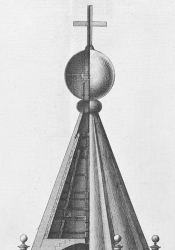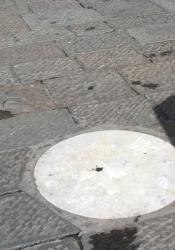Brunelleschi's Inspiration
When Brunelleschi began to design the structure of the Florence Duomo's lantern, he was conflicted on how he should go about supporting the arches. One of his options was to adopt the technique used in Ancient Rome and have tie rods on the arches and cupola. Brunelleschi had long had an affinity for the architecture of Ancient Rome after he failed to be recognized as one of the first sculptors in Florence during his time. Nevertheless, he was still a sculptor with a rare creative mind that led to him creating several inventions and works of art. His desire for inspiration to help with the dome's construction and love for techniques created in Ancient Rome drew him to travel to Rome to see it all for himself.
Works Cited
Prager, Frank D., and Gustina Scaglia. Brunelleschi: Studies of His Technology and Inventions. Dover Publications, 2004.
Parent Map
Coordinates
Longitude: 12.496365500000


